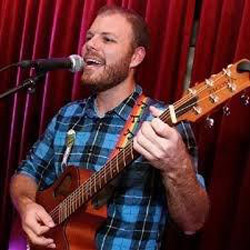By Eva Trieger


SAN DIEGO — “I’d like to teach the world to sing in perfect harmony,” I believe this could be his mantra. The singer/songleader told me he believes that, “music has the power to bring people together and build interfaith, justice oriented, warm welcoming communities.”
Recently appointed to a new commission, Voit is the cantorial soloist at Temple Emanu-El. He is enjoying this role very much as a music specialist, choir leader, and preschool music teacher. He reported that he feels he has his “finger on the pulse” of the congregation and is evaluating how things have been done and determining if a shift is in order. Voit is replacing Myrna Cohen after her 27 year reign. Currently, Voit is thrilled to be working with Rabbi Devorah Marcus who shares his enthusiasm for growth.
Marshall Voit grew up with parents who always championed social activism. He is no stranger to marches, protests, rallies, and movements intended to promote peace between factions. Rabbi Laurie Coskey, Marshall’s mom and Executive Director of the Interfaith Committee for Worker Justice, encouraged him to find his voice in speaking out against atrocities and injustice. In an effort to fine tune his effort, Voit is completing his Masters in Ethnomusicology. His program at San Diego State has afforded him the opportunity to study domestically and internationally.
In Australia, Voit enjoyed the post of being a musical provider to a progressive congregation as well as being a resource provider. He reaped rewards from being the Musician in Residence for the Union for Progressive Judaism overseeing Australia, New Zealand, and Asia. During this time, Voit feasted at a seder in Shanghai, and led Shabbat services throughout his travels.
When working with foreign language speakers, Voit attempts to keep the songs simple and employs a “call and response” technique, so that the singers can learn a few phrases and are more willing to join in. When the songs are in other languages, transliterations are supplied so that the audience is not afraid to participate
I was curious to know about Marshall’s role models. He reported many, but topping the list was singer/ songwriter Debbie Friedman, whom he attributed as having “started us all in Reform Judaism.” Additionally, Voit had the honor and pleasure of learning in a camp, HavaMeshira, in Wisconsin, geared toward Jewish song leaders. Here, experienced and novice songleaders could connect and exchange ideas. During these trainings, Voit found new approaches to singing from Rosalie Boxt, Jeff Klepper, Josh Nelson, Dan Nichols and Shira Klein. They became his template for successful songleading. From these icons, Voit learned how to improve, and his journey grew wings.
Much of Voit’s imprinting, comes from growing up and hearing civil rights activists/folk singers. Greats, such as Pete Seeger, Woody Guthrie and Joan Baez demonstrated a “seamless transition into activist songleading.” These standouts vividly mapped the course for the budding Voit, and showed him how to employ his words and music to affect change. And yet, although Marshall Voit found a calling and knew his passion, no clear path had emerged, showing him how to attain his goal.
His own path is not overtly religious. Voit grew up in a Reform household, but his indoctrination was embedded with Jewish Liberalism. He became active in Hillel and affiliated with Jewish organizations throughout his life.
The most compelling force behind Marshall Voit’s writing and singing is his interest in “making human values more important than market value.” Voit revealed that the singing provides a “spiritual nostalgia” that benefits the songleader, but also impacts the singers and the listeners. While not everyone is a confident singer, Voit enumerated the ways in which singing frees the singer and invites his/her neshama in a way that encourages chiming in. He acknowledged that at diffferent times there are a host of reasons why one may hold back on joining in: sore throat, a recent loss, or simply the idea that one can’t carry a tune. When singing with a group, a new found source of strength may bolster that individual and allow him/her to surpass that hurdle, according to Voit.
Voit has just recently relased a new CD. “Common Ground” is available on CD Baby and iTunes as a download. It may be purchased through PayPal. The 13 tracks each speak to the rejoicing of the human spirit and most of the tunes are covers of songs that are a call to action “to work together for justice, peace and equity.” Voit envisions a world where poverty is not a reality, and his songs emphasize his dreams. He has a new CD in the works, to be released in 2016, that will contain more original numbers.
Take note: On December 6th, a Hannukah Hootenany is slated for Temple Emanu-El. This will be a sing-along jam session on the first night of Hannukah. Lyrics and sheet music will be provided. It will be in the form of a jam session, with no rehearsal. Everyone is invited to attend this first of future sing-along sessions. The songs presented will focus on light, folk songs and our journey from Oppression to Liberation.
If you join Voit for a part of this journey don’t worry about harmonizing. My own personal philosophy is that when it comes to singing, “Intention is 9/10 of the law.”
*
Trieger is a freelance writer who specializes in coverage of the arts. She may be contacted via eva.trieger@sdjewishworld.com